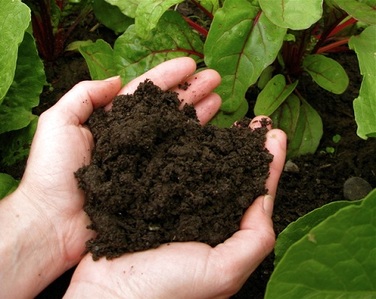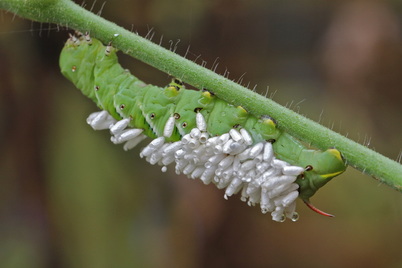A Whole-Farm Approach
As we pursue our goal of building a successful farm business, we want to make sure that future generations will have the same opportunity. Our agricultural practices minimize the environmental impact of our farming operation and promote the long-term health and stability of the whole farm ecosystem.
Our Approach to Soil Management
Soil is more than just the "dirt" in which we plant our crops. It is a complex community of minerals, nutrients, bacteria, fungi, and other living (and dying) organisms. In fact, soil is the most biologically diverse part of the earth. Good soil is the lifeblood of a farm, so we place a lot of emphasis on practices that improve the quality of our soil.
|
Our Approach to Pest/Disease Management
All farmers need a plan to deal with the various insects and pathogens that affect the crops we grow. We utilize a broad-based approach, called integrated pest management (IPM), to protect our crops, while minimizing risks to both people and the environment. The specifics of IPM can vary from farm to farm, but at Keelboat Farms, we adhere to a core set of strategies when it comes to dealing with pests.
|
Our Approach to Resource Management
Natural resources are not an unlimited commodity, so we do what we can to use them responsibly. We favor a bio-intensive approach which focuses on the long-term sustainability of the entire farm system.
- We minimize our farming footprint. We use techniques that focus on achieving maximum yields from a minimum area of land. Intensive spacing, vertical growing, succession planting, and other practices allow us grow everything we need on less than 2 acres of cultivated space.
- We conserve water. Growing thousands of pounds of vegetables takes a lot of water, so we try to make the most out of every drop. Our garden paths are designed to function as mini-swales, which hold rainwater that would otherwise run-off and be wasted. Most of our crops are watered with drip irrigation, which puts the water near the root zone, where plants can utilize it.
- We conserve energy. Most of our farm work is done with hand tools and small-scale equipment, like our Grillo walking tractor, which reduces the amount of fuel we need to use. We employ alternative energy sources whenever possible, such as solar fencing to keep deer out of our vegetable plots.
- We preserve wild spaces. For our farm ecosystem to be healthy, we need to take care of all of it, not just the cultivated areas. We spend a lot of time removing invasive species, planting native trees and wildflowers, and enhancing wildlife habitat on other parts of our farm. We also have several "sanctuary" areas that we leave alone, so that we can sit back and observe nature at work.
If you would like to see our farm operation, we will be holding several on-farm field days and volunteer work days this spring. Contact us for more information.



